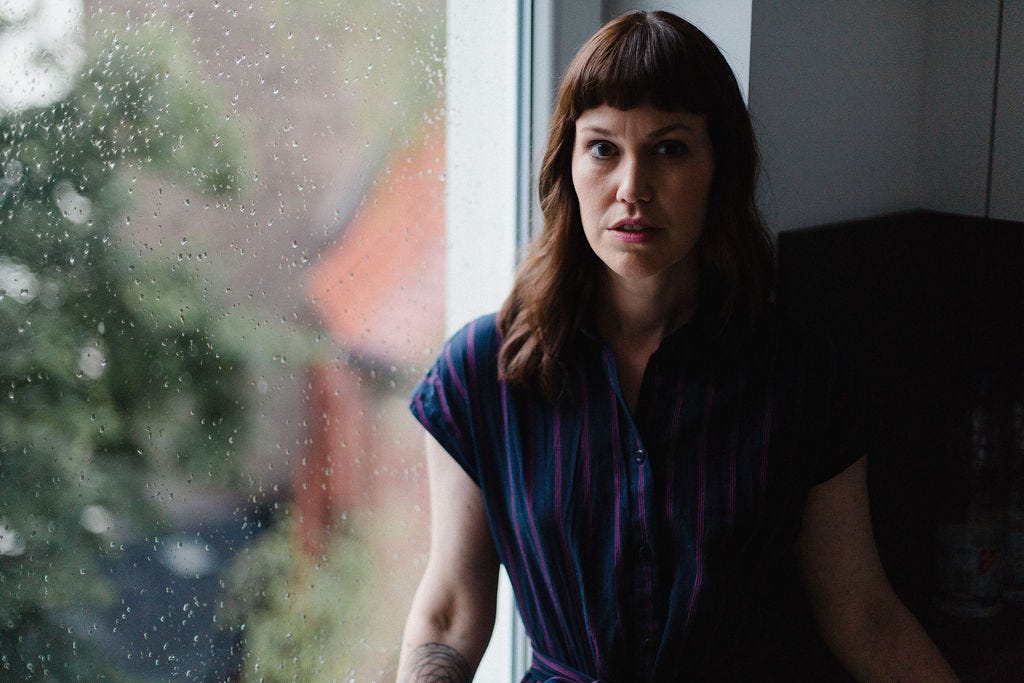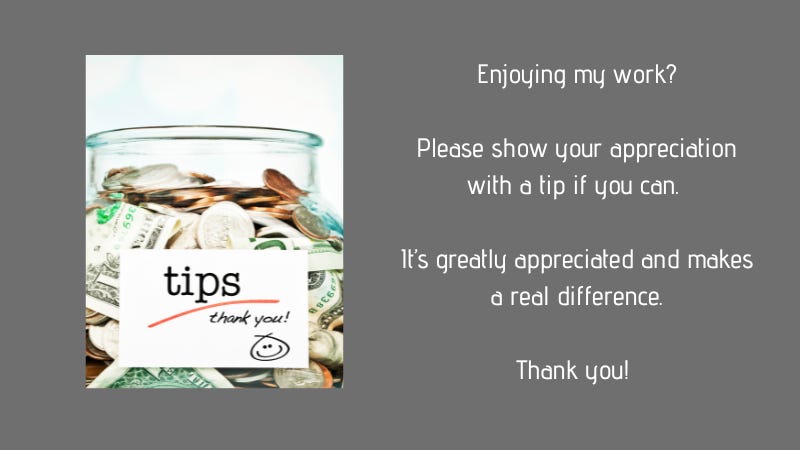Hi, I am delighted to welcome my first ever guest writer to The Mindful Writer today. Caroline Donahue writes the excellent Book Alchemy where book lovers hang out and talk about reading and writing them.
Caroline is an American writer, podcaster, and writing coach living in Berlin. She holds a masters degree in Psychology and Expressive Arts. Since 2016, she's hosted the award-winning Secret Library podcast about writing and publishing, interviewing everyone from prizewinning and bestselling authors to those preparing for their first pub day. She’s the author of The Story Arcana Guides: The Author’s Journey and Writing through Fear.
I invited her to write for us about the fear we all feel when it comes to being a writer.
With love,
The fear of calling yourself a writer
“Oh, I’d love to write a book, but I’m not a writer.”
I’ve heard this more times than I can count, in response to my telling people I’m a writer. Despite most of our communication these days being in written form — who makes a phone call when a text message will do the trick? — people get very anxious when choosing to identify as a person who writes.
This is one of the biggest obstacles people face when tackling the challenge of writing a book. We all have stories to tell and experiences that are unique to us, even as common hopes and desires unite us all as humans. Even knowing this, we feel we must earn the right to write.
I was very moved by Amanda’s two-part piece on how changing the story she told herself about who she was transformed her life. Given that writing is this powerful, powerful enough that there is an entire branch of therapy based on this premise called Narrative Therapy, why are we so hesitant to claim this for ourselves?
When I started writing seriously about twenty years ago, alongside other “real” work to pay the bills, it was very difficult to trust that I knew what I was doing. Writing, like many creative vocations, doesn’t require an advanced degree to do the work. While it’s possible to get a graduate degree in writing, just as many published writers don’t have this qualification as do.
As a result, my past pull to get an MFA or Masters in Creative writing, as well as the desire I see in many students and clients, is more about gaining belief in ourselves being able to write, than about any skill we think we will learn in the training.
If I have an MFA, I will know how to be a writer
This seems to be what the desire to get advanced training in writing stems from. Why don’t we believe we can write as adults, when as children we have stories bursting out of our seams? What is it we’re so afraid of?
Having taught hundreds of students and worked with clients for over ten years, the most common fear I see is that people are terrified of “doing it wrong.” And if they do it wrong, they will then be exposed as imposters and never be allowed to write again. With this terror lurking in their minds, it’s safer to dream of one day being anointed as writers rather than getting into the messy work of writing here and now.
I hate to tell you this, but there is no training or preparation out there, not even a doctoral degree, that will remove the fear that you’re doing it wrong. Every one of the hundreds of authors I’ve interviewed for the Secret Library Podcast, even the prizewinning ones, still has this fear many times while writing books. No matter how many they’ve already published, no matter how beloved and respected those books are.
What the real work of being a writer is, based on my experience and observation, is getting comfortable with uncertainty, while building up the trust that you will figure it out.
As Amanda wrote, the story we tell ourselves about what we are capable of is crucial. When hitting a point in a writing project, it’s natural to wonder which of multiple choices would result in the strongest piece. However, we don’t phrase it this way most of the time. Instead, the most common reaction is to ask ourselves questions like:
“What should I do?”
“Which of these is the right choice?”
“Is this piece any good?”
I could go on for days about “good” being the number one adjective that shuts down writers and causes needless panic and suffering, but let’s leave that aside for now. Let’s look at these statements, because they’re really good clues about how our internal critics shut us down and keep us from doing the creative work we so badly want to do.
What each of these questions assume is that being a creative means having the ability to know what the one right answer is and being skilled enough to execute that idea once you have identified it.
Having no right answer means you’re on the path
There is no one right answer in writing. In any given book, essay, blog post, memoir, screenplay, short story, or any other of the variety of writing forms that exist, there are an infinite number of possibilities. This is both wonderful and terrifying. We try to still the anxiety with this belief that there is a right answer, we just have to find it.
You may have heard about a scientific study conducted on the tyranny of choice. Scientists had research subjects do a task the subjects believed was the purpose of the study. After they completed it, they were split into groups that were either asked to choose a jar of jam from a small number of flavor options or from a large array of choices. They were then asked how satisfied they were with their choice. Consistently, those who got the smaller selection were happier.
Unfortunately, as writers, we are always faced with the large selection. We can always change or expand or tweak the possibilities to create something new. The antidote to this is not, as we often believe, to make the choices smaller.
The way to increase confidence and to feel that we have earned the title of “writer” is to become comfortable with this uncertainty and to accept it as part of the process. If you get scared when you’re not sure what happens in the next chapter, this isn’t evidence that you aren’t a writer. In fact, it’s the opposite: you are deeply engaged with the work if this question has come up, and it doesn’t get more writer than that.
When in these moments, I constantly think of the Buddhist teacher and educator Ruth King. In her book Mindful of Race, and in her training, she often posed the question, “Can I be uncomfortable without it being a problem?” While this is absolutely central to antiracism work, I feel it also applies just as much to writing.
Being a writer doesn’t mean that discomfort and uncertainty disappears. It means that we trust ourselves to engage thoughtfully with this discomfort and find an answer on the other side. Not THE answer, an answer. The best we can do is trust that the one we found today is the right fit for this moment.
And then, as writers, we continue the story tomorrow, learning who we are then and the story that new version of ourselves tells. This is how we change the world: we stay with the writing, and we trust we are up to the challenge. I hope you’ll dive in and see what you can find.
Thanks so much, Caroline. I agree there is never a definitive answer in writing, especially in fiction. It’s about finding what’s right for that story and that character at that time. If you wrote the same story five years later, the answer may be different!
What do you think of what Caroline has said here about diving in despite the fear? Has fear ever stopped you from finishing a story?
Come write with me
There are lots of different ways to come and mindfully develop your writing with me.
The first Mindful Novel Course starts next month. I’ve been teaching a year-long novel writing course for 7 years and I have adapted my teachings to bring this brand new version that goes deep and slow to write a novel that has real emotional depth and brings new insights into being human.
The third group of A Year of Mindful Writing will start in January 2025 and applications are open now. The first group that started in January 2024 has done amazing work so far and we are going to go straight into a second year together in 2025!
Join me for a week dedicated to the art and craft of short story writing at the Short Story Retreat in November 2024. You’ll have a cosy room of your own, delicious vegetarian food, workshops and lots of writing, reading and napping time.
Come to a Mindful Writing Marathon where we’ll spend two hours writing and reading out without giving any responses to each other’s work. Inspired by Natalie Goldberg’s Writing Down the Bones: Freeing the Writer Within. These are included with paid memberships to the Mindful Writer or you can pay as you go.
My free Mindful Writing Hours sessions are starting up again in October and will run every week on a Thursday. Time to get words on the page alongside each other.
Thank you for reading The Mindful Writer. If you enjoy my posts and would like to commit to a slower, more mindful writing practice, please consider becoming a supporter for only £5 a month, less if you pay for a year in full.
Alternatively, a one-time donation will help me continue the hard work behind bringing these posts to you.











Amanda, thanks for introducing me to Caroline and her work. Greatly appreciated.
Caroline, I really enjoyed this. I spent the majority of my adult life in the U.S. Navy. I never had formal training as a writer. My degrees are in Criminal Justice and Management. But here I am, writing faithfully each week. I loved this quote you provided - “Can I be uncomfortable without it being a problem?” That really gets to the heart of it. Writing puts us in a place where being vulnerable is the norm. If I can learn to function in that environment then I can push forward with writing. Thanks again.
Loved this piece! It's generous and wise of Amanda to find writers who share her literary values and highlight their words for her readers. That's integrity and strength of character! Thanks to you both!